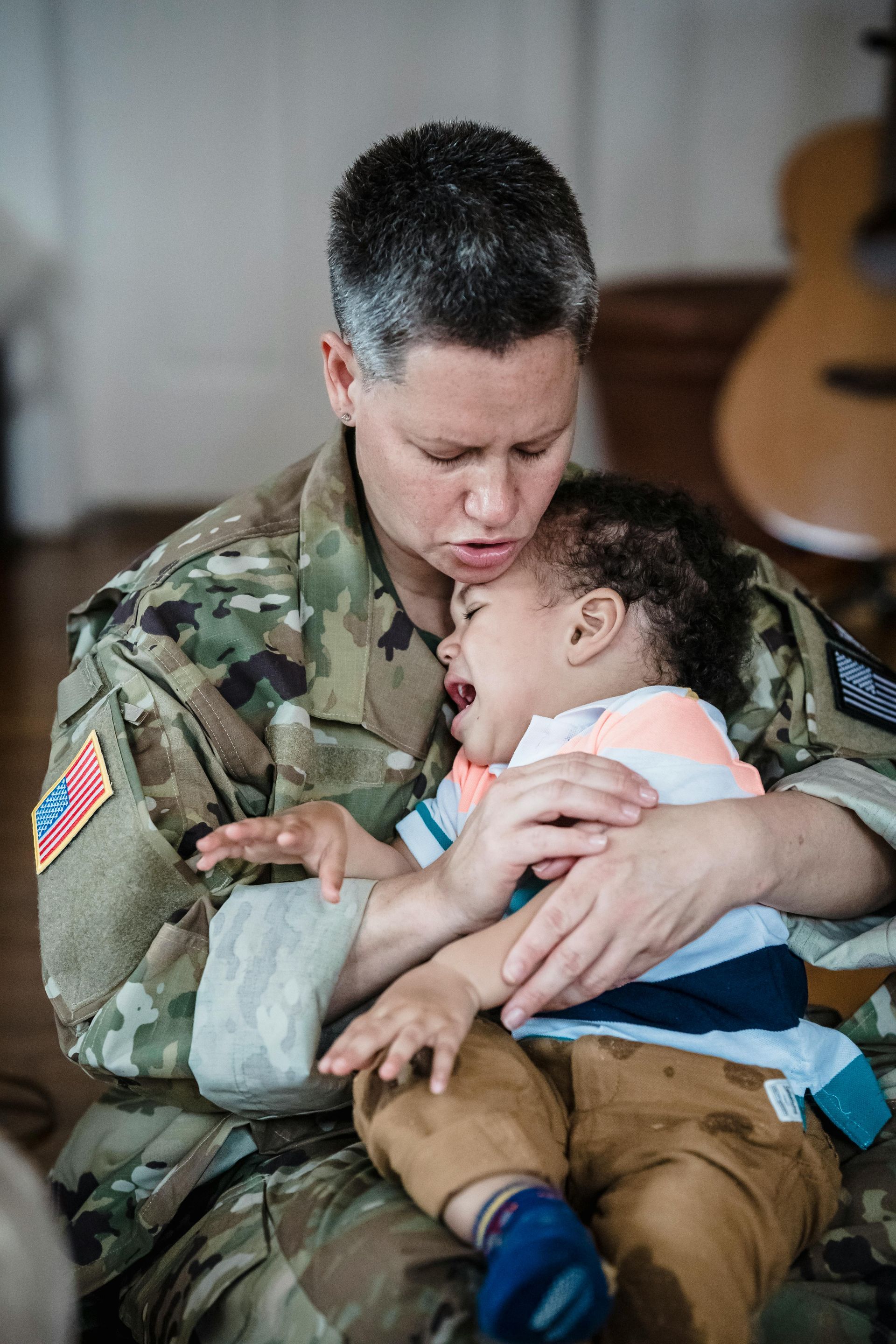PARENTING IN ALIGNMENT WITH YOUR VALUES
Shared Values of Authoritative Parents

The shift is choosing to parent in alignment with the very values we want to instill in our child. It is easy to see the absurdity of trying to teach a child not to hit by hitting them or calming down by yelling at them. Yet this same contradiction plays out in countless other ways. When we try to teach respect through shaming, honesty through threats, or kindness through harshness, we undermine our own message. The truth is, children embody values by watching us live them. If we want them to grow into respect, honesty, compassion, and self-control, we must model those qualities ourselves. Anything less is like planting seeds in rocky soil.
Living in alignment with our values feels good. Falling out of alignment feels heavy and unsettling. Parenting is one of the clearest mirrors of whether we are living in alignment, because every day we act out what we truly believe about love, leadership, and growth.
Parenting in love means choosing loving actions. It means standing firm in boundaries while holding space for our child’s displeasure. It means showing up as capable leaders who reflect the values we want our children to grow into. We instill these values not by demanding them, but by modeling them in how we move through the world as parents, partners, and community members.
Parenting out of fear looks very different. It is when we tell ourselves, “If I let them get away with this, they will never learn,” or “If I do not stop this now, they will turn out spoiled.” Fear convinces us that the only way to teach is through control, shame, or threats. We may justify harshness as being “for their own good,” but fear-driven parenting is usually disconnected from the values we say we hold most dear.
The invitation is to ask: Am I parenting from love or from fear?
Understanding Parenting Paradigms
Every parent operates within a paradigm, whether consciously chosen or unconsciously inherited. A paradigm is the overarching approach that shapes how we connect, discipline, and guide our children. Recognizing these paradigms matters because they reveal not only what we do in the moment but the values we are modeling day after day.
There are four widely recognized parenting paradigms.
Uninvolved parenting is low in warmth and low in expectations. A child in this environment is often left adrift, receiving the message that they are on their own. This style can emerge when parents are in survival mode themselves, without the community, support, or resources they need. In these circumstances, parents may be able to meet only the most basic physical needs (food, shelter, clothing) while being unable to provide the emotional presence and guidance a child requires. The lack of involvement communicates not only disconnection but also invisibility, leaving the child without a felt sense of safety or belonging. Over time, this can lead to struggles with self-esteem, social skills, and achievement, as well as difficulties trusting others to be reliable or emotionally available. A child may grow up feeling as though they must fend for themselves, carrying both the weight of unmet needs and the loneliness of not being seen.
Permissive parenting is high in warmth but low in expectations. Parents are loving and accepting, but they avoid setting boundaries and often allow the child to lead. While this may seem to prevent conflict, a child raised this way misses the sense of safety that comes from strong leadership and may lack opportunities to practice responsibility, respect limits, and develop self-discipline. Over time, permissive parenting can also lead a child to feel anger and resentment toward their parents. Even if they cannot fully articulate it, they sense on a deep level that no one is leading them. That absence of guidance can feel unsettling, frightening, and frustrating, which may cause a child to be angry with and resent their parents.
Authoritarian parenting is high in expectations but low in warmth. It relies on control, strict rules, and punishment, sending the message that obedience matters more than connection. Children raised in this environment may comply outwardly but often struggle with self-esteem, stress, and trust. This is parenting through fear, where the values that get passed down are compliance, submission, and silence rather than respect, responsibility, and resilience.
Authoritarian parenting tends to produce either compliance or defiance. A compliant child may become a people pleaser, suppressing their needs and wants to the point of losing touch with them altogether. A defiant child may dig in their heels and push back, leading authoritarian parents either to escalate their methods at the expense of the child’s self-esteem and the parent-child relationship, or to recognize the harm, stop, and seek a different way forward.
Authoritative parenting is both high in warmth and high in expectations. It represents balance. These parents set boundaries and hold high standards, but they also provide emotional safety, empathy, and support. They say things like, “I can see this hard for you right now. I will help you through it.” Research consistently shows that this approach produces the healthiest long-term outcomes: independence, resilience, social competence, and self-confidence. This is parenting in love, where the values being modeled are connection, accountability, and trust.
When we understand these paradigms, we can see that we are always teaching values, sometimes fear-based ones, sometimes love-based ones. The question is not if we are modeling something, but what we are modeling.
Shared Values of Authoritative Parents
Authoritative parents share certain core values that set the tone for how their families grow and connect.
They value connection, making time to know their child’s inner world.
They value empathy, listening with the intent to understand rather than to fix.
They value non-violence, rejecting physical or verbal harm and instead modeling peaceful conflict resolution.
They value emotional safety, recognizing that children’s emotions are not threats but invitations to co-regulate, validate, and eventually teach emotional skills.
They value self-care, knowing that they cannot parent well if they are depleted.
They value conscious communication, choosing words that build connection rather than fear.
They value discipline as teaching, not punishing.
They value boundaries and see them as opportunities to guide, not control.
They value repair, acknowledging mistakes and making amends when they fall short.
They value forgiveness, offering it freely as part of the growth process.
They value modeling, showing rather than just telling.
And they value playfulness, recognizing that joy and lightness are essential ingredients of family life.
These values are not abstract. They are lived every day. When we parent from them, we move from fear into love, from control into connection.
Parenting in Your Values
Each of us parents from a set of values, whether we realize it or not. Every choice we make, every response we give, is modeling something to our children. If we parent from fear, they learn fear. If we parent from shame, they learn shame. If we rely on threats and punishments, they learn that power means control. Whatever we repeat becomes the message they absorb. These become the values they carry forward, whether or not we intended to teach them.
If we parent in love, however, we teach respect, presence, and responsibility. We show our children that leadership can be firm without being harsh, and that boundaries can coexist with connection. Parenting in our values is about consciously choosing which lessons we want them to internalize, and then aligning our actions with that choice.
Parenting in love looks like firmness with connection. It means modeling the values we want to see, acknowledging and accepting feelings, and truly seeing and hearing our child. It means taking responsibility for our own emotions, problem-solving together, and allowing natural consequences to teach. Parenting in love is staying calm in the storm, welcoming all feelings without fear, and setting and holding boundaries with steadiness. It is remaining present, practicing honesty and respect, offering repair and apology when needed, choosing forgiveness, and accepting what is with grace.
Parenting in fear looks very different. It sounds stern and harsh, using time outs or punishments to control, comparing one child to another, or relying on threats and shame. It shows up in scolding, manipulating with rewards, long lectures, spanking or hitting, ignoring, yelling, labeling, or being facetious at a child’s expense. These actions may be done for their own good, but what they really teach is fear, power, and disconnection.
We do not always live in perfect alignment with our values, but the call is to wake up to the kind of actions we are choosing. Each moment of misalignment is an opportunity to reflect, repair, and return to the values that matter most to us. Parenting in love is not about perfection, but about practicing alignment. When we fall short, we can acknowledge it and begin again.
The question to carry is simple: Am I teaching my child fear, or am I teaching them love?
Reflection Questions
- In the last week, what actions have I taken that reflect parenting in love, and what actions reflect parenting in fear?
- When I think about the values I most want to pass on to my child, am I modeling them in my daily behavior?
- How do I respond when I notice myself slipping into fear-based parenting, and what helps me realign with my values?
- If my child were to describe what I model most often, connection, fear, respect, or control, what would they say?










